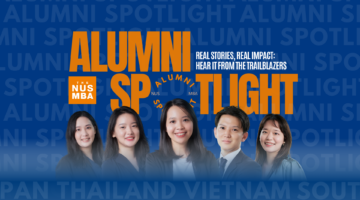Masahiro and Maki Okuda: Thriving as Professionals, Parents, and NUS MBA Students
Pursuing an MBA is no small feat, but doing it alongside your spouse while raising children takes it to a whole new level. Masahiro and Maki Okuda have embraced this challenge together, pursuing part-time MBAs at NUS while balancing the demands of parenting and professional growth. “We believe that watching their parents work hard in a global environment and stay eager to learn new things will leave a deep impression on our children,” says Masahiro, who currently works in the energy industry. His wife, Maki, who works in the financial services industry, shares this vision. With mutual support and determination, they’re turning this demanding chapter into a rewarding journey for their family. Let’s take a closer look at how they make it work.
A shared vision for growth
For Maki, the decision to join the NUS part-time MBA program stemmed from her ambition to transition into a management role while advancing her career. “NUS’s Asia-focused curriculum and flexible format were perfect for taking my career to the next level without compromising on work and family,” she shares.
Masahiro saw the program as an opportunity to align his academic pursuits with his professional aspirations. “Studying at NUS gave me access to invaluable business knowledge and connections that align perfectly with my goal of expanding the energy business in ASEAN,” he explains.
The timing of his enrollment was also strategic. “Since I was on professional leave, this was the perfect time to build new networks and gain knowledge that I wouldn’t have had the chance to acquire otherwise,” he adds. While it’s not uncommon for partners to share similar ambitions, what sets Masahiro and Maki apart is their decision to pursue this journey together—balancing careers, parenting, and academics as a team. We’re curious to learn what keeps their partnership strong and how they make it all work.

Embarking on the MBA Journey as a family
The couple’s decision to pursue their MBAs simultaneously wasn’t initially part of the plan. Maki had started her program first, inspired by her long-standing goal of earning an MBA in her 20s. “My husband was transferred to Singapore for his work, so I initially thought of taking a leave of absence to focus on studying,” she says. Eventually, she secured an expatriate assignment in Singapore, allowing her to balance her professional and academic pursuits.
Masahiro, inspired by Maki’s dedication, followed suit a year later. “It made sense for us to pursue this journey together,” Maki reflects. “Our children were a little older, and we realised we could support each other through this shared experience.” So what’s the day-to-day experience like?
Their daily routine shows how they manage their time carefully while balancing many responsibilities. Masahiro takes the lead in managing housework and childcare during the weekdays, while Maki focuses on her professional commitments. On weekends and evenings, the couple alternates their MBA classes to ensure one of them is always available for their children.
“On days when Masa has classes, I adjust my work schedule to be home for dinner and homework with the kids before diving back into my own assignments,” Maki explains. She also notes the challenges of balancing priorities: “When work piles up, and MBA assignments overlap, weekends can be quite hectic. But we make it a point to refresh ourselves by spending time as a family, whether playing badminton or dining out together.”
Balancing their overlapping roles hasn’t been without its challenges. Irregular class schedules or joint sessions occasionally require quick adjustments. “In cases where neither of us can look after the kids, we’ve had to arrange for a home helper on short notice,” Maki shares.
The couple has developed strategies to navigate these challenges. Maki credits the NUS MBA program’s flexibility in helping her adjust. “I take fewer classes during busier work periods and prioritise subjects I’m deeply interested in,” she says. Group projects are tackled efficiently: “I work with my teammates to organise assignments and schedules well in advance, avoiding the last-minute rush.” It’s clear to see that teamwork makes the dream work for the Okuda family!

Strengthening their partnership
Beyond academic and career advancements, the shared MBA experience has deepened their bond. Masahiro notes how group work at NUS exposed him to diverse perspectives, expanding his worldview. “I’ve learned to see challenges from multiple angles and appreciate different problem-solving methods,” he says.
For Maki, one of the most rewarding experiences was leading a consulting project for a startup in women’s healthcare—a field she’s deeply passionate about. “The opportunity to work with a diverse team and receive high praise from the client gave me confidence and invaluable hands-on experience,” she says.
She also initiated a network for working mothers within the MBA program, creating a safe space for women to share their challenges and successes. “Talking to peers from different cultures and nationalities helped me gain new perspectives on balancing family, work, and personal growth,” she reflects.
Their children have also been active participants in this journey, experiencing the vibrancy of an international community through NUS events and friendships. “Our kids see us striving to learn and grow, and I believe that leaves a lasting impression on them,” Masahiro says. Maki agrees, adding, “The children enjoy meeting friends from different nationalities at weekend barbecues. It’s been a great way for them to experience international exchange beyond school.”
Advice for aspiring candidates
With their well-rounded experience, Masahiro and Maki show that working parents can balance it all and thrive. For those considering an MBA, Maki offers this encouragement: “It’s natural to worry about balance, but the experience is incredibly rewarding. The network you build and the doors it opens are worth the effort.” Masahiro adds, “The key is to embrace the challenges and work as a team—whether with your partner, family, or MBA peers.”
Masahiro and Maki’s story highlights how the right mindset and a strong support system can transform challenges into meaningful opportunities. Indeed, they prove pursuing ambitious goals while keeping family close is possible. If you’re a working professional or parent considering an MBA, their journey is a reminder that the rewards are well worth the effort—why not take the first step today?


